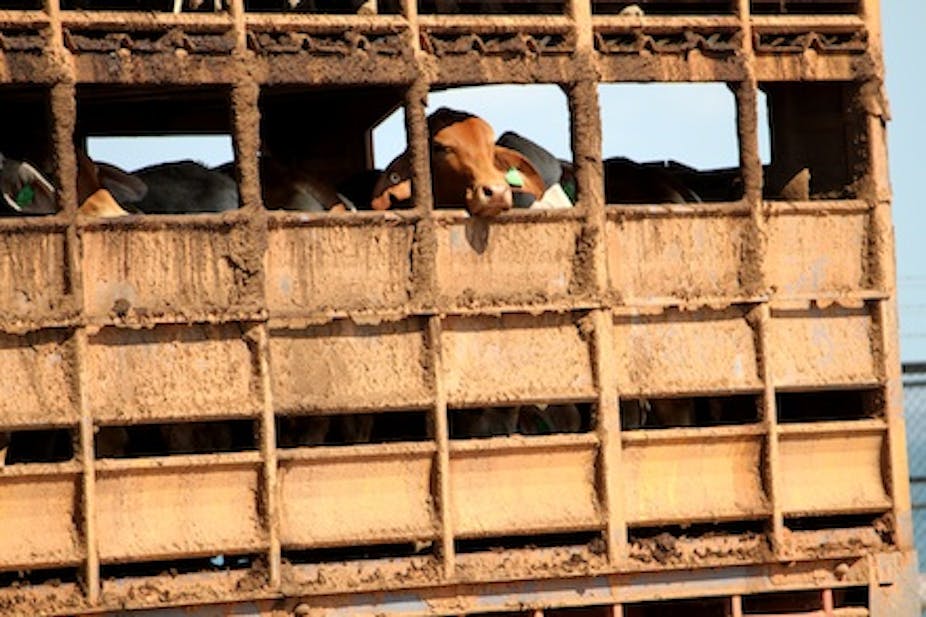Last week’s resounding defeat of two private members bills seeking to end live animal exports demonstrates the myopic vision Australian politicians have for the country’s agricultural industry.
This is quite understandable; Australia is financially very comfortable relative to other developed countries at present and this encourages a narrow conservatism.
But animal welfare is rarely affected much by legislation; the vast diversity of animal keeping systems does not lend itself to legislative control, and our legal system still has not been able to identify a role for animals that is some way between being “property” and full personhood, a status attributed to humans alone.
Animals legally remain as property and their protection will remain difficult until a status is defined that matches the level of care that most people want to provide for animals.
The exposure of horrific slaughter practices in Indonesia will not have been in vain because the real vanguards of the welfare of livestock are the cattle producers themselves.
Many were badly affected by seeing the cattle that they had nurtured unceremoniously hacked to death in Indonesia, while those waiting in line stood shaking in fear.
The major pastoral companies were already aware of the risk to their trade that public antipathy could present, and at least one of them, AACo, had plans to build an abattoir near Darwin.
We can be pretty sure that building contractors can expect a lucrative contract in the near future.
All sectors of the industry lost the respect of the public: the producers, the exporters and perhaps most of all the industry representative body, Meat and Livestock Australia (MLA).
While we may excuse producers for not being fully aware of the situation, there is no doubt that MLA knew how our cattle were being slaughtered and so did our government.
Their underestimation of the risk may yet cost them dearly as the demands escalate for animal welfare management to be taken out of the hands of MLA and government and placed under the control of an independent body.
This has proven very successful in England, where the independent Farm Animal Welfare Council has advised government on welfare issues since 1979 and recommended suitable research to be conducted to address the problems.
The livestock industry in England is a fraction of the size of the Australian industry, so why has federal government not sought to protect the long term future of our industry in this way?
State governments have already gone part way down this road, establishing independent Animal Welfare Advisory Committees, but it would be far more effective and less wasteful to have a national council.
Meanwhile the public are being kept fully informed of the risks of live export as new footage from a Turkish abattoir was released by Animals Australia, showing fully conscious sheep being shackled by the rear leg and hoisted three metres in the air before their throats were cut.
Animals Australia investigator Lyn White told reporters she could not confirm the animals captured in the footage were Australian, but said Australian animals were killed there.
This is a rare instance of regulations helping to protect the animals as it is a clear breach of the OIE standards, to which Turkey is a signatory.
To add to the exporters’ plight, almost simultaneously a live export vessel, the Al Messilah, broke down with 67,000 sheep on board and had to return to offload its cargo in Adelaide.
It has been reported that 200 sheep have died and while they have been off-loaded to a secure quarantined location, these sheep will have suffered considerable stress throughout the process.
Will compassion fatigue set in amongst the public, as it sometimes does when we are confronted with repeated images of starving Africans?
I doubt it, these are problems that are much closer to home, and the Australian community has clearly indicated its desire to see the trade ended.
Live exports to Turkey cannot be justified on the grounds of insufficient refrigeration capacity in households, which is a relevant issue in Indonesia.
A lack of compassion for animal welfare cannot be excused on the grounds of poverty, again an issue in Indonesia.
In a recent survey undertaken with a visiting researcher to my centre, Serdar Izmirli, I found that empathy towards animals was actually higher in Turkish veterinary scientists and students than Australian ones.
These latest problems will cement the Australian community’s lack of trust in the export process.
If this continues to be a high profile issue, the government may find it can only ignore the wishes of the people for a short period before they are replaced with a more representative body of politicians.

